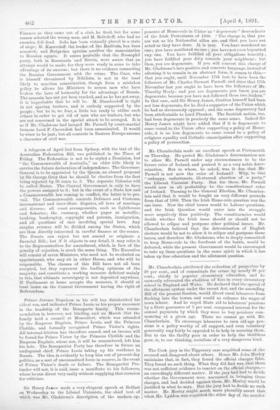A telegram of April 2nd from Sydney, with the text
of the Australian Federation Bill, was published in the Tinto of Friday. The Federation is not to be styled a Dominion, but "the Commonwealth of Australia," an older title likely to survive the future declaration of independence. The Governor- - General is to be appointed by the Queen, an absurd proposal by Sir George Grey that he should be elective from the first being rejected by 35 votes to 3. The separate Colonies will be called States. The Central Government is only to have the powers assigned to it; but in the event of a State law and a Commonwealth law coming in conflict, the latter is to pre- vail. The Commonwealth controls Defences and Customs, international and inter-State disputes, all laws of marriage and divorce; all coast arrangements, such as lighthouses and fisheries ; the currency, whether paper or metallic ; banking, bankruptcy, copyright and patents, immigration, and all questions of race involving special laws. Any surplus revenue will be divided among the States, which are thus directly interested in careful finance at the centre. The Senate can reject but not amend or originate a financial Bill ; but if it objects to any detail, it may refer it to the Representatives for amendment, which, in face of the penalty of rejection, is much the same thing. The Executive will consist of seven Ministers, who need not be re-elected on appointment, who may sit in either House, and who will be responsible. The clauses of this Bill have not all been accepted, but they represent the leading opinions of the majority, and constitute a. working measure deficient mainly in this, that ultimate sovereignty is not deposited anywhere. If Parliament at home accepts the measure, it should at least insist on the Central Government having the right of Referendum.






































 Previous page
Previous page